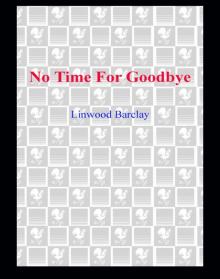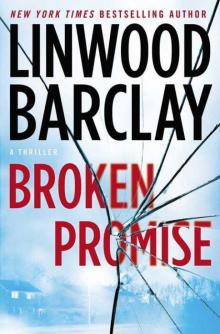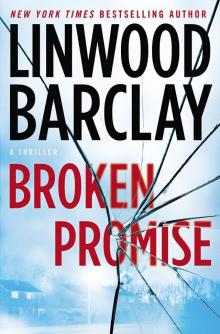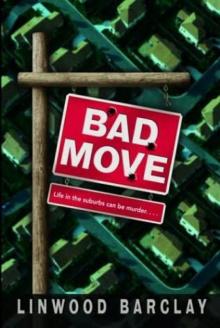- Home
- Linwood Barclay
Broken Promise Page 5
Broken Promise Read online
Page 5
“I don’t see any stores around here,” Marla said.
“I have to make a stop,” I said.
I turned onto Breckonwood, worried that I might see half a dozen police cars and a news van from Albany. But the street was quiet, and I found some comfort in that. If someone had called in a report of a missing child, the street would have been abuzz. I found 375, then steered the car over to the curb.
“This look familiar to you?” I asked, twisting around to get a look at Marla and Matthew, who had a tiny smile on his face.
She shook her head.
“You know anyone named Rosemary Gaynor?”
Marla eyed me suspiciously. “Should I?”
“I don’t know. Do you?”
“Never heard of her.”
I hesitated. “Marla, it has to have occurred to you that this baby—Matthew—came from somewhere.”
“I told you where he came from. The woman who came to my door.”
“But she had to get Matthew from someplace, right? Someone had to give him up for you to have him.”
She was nonplussed. “It must have been someone who couldn’t look after him. They asked around and realized I could provide a good home for him.” She offered up a smile that seemed as innocent as Matthew’s.
I didn’t see the point of pursuing this any further. At least not right now. I said, “You sit tight. I’ll be back in a minute.”
I got out of the car, pocketing the keys, and took in 375. The structure was newer than many on the street, suggesting an older house had been torn down and this built in its place. Well landscaped, two stories, double garage, easily five thousand square feet. If anyone was home, there was probably a high-end SUV sitting behind that garage door.
I went to the door and rang the bell. Waited.
I glanced back at the car. Marla’s head was bent down as she talked to the baby. About ten seconds had gone by without anyone answering, so I leaned on the doorbell a second time.
Another twenty seconds went by. Nothing. I got out my phone, reopened the app that had brought up the phone number for the Gaynors, tapped the number, and put the phone to my ear. Inside the house, I could hear an accompanying ring.
No answer.
Nobody home.
I heard a car approaching and turned around. A black four-door Audi sedan. It turned, quickly, into the driveway and stopped within an inch of the closed garage door, the brakes giving out a loud, sharp squeal.
A slim man in his late thirties, dressed in an expensive suit, jacket open, tie askew, threw open the door and stepped out.
“Who are you?” he snapped, striding toward me, his keys hanging from his index finger.
“I was looking for Rosemary Gaynor. Are you Mr. Gaynor?”
“Yeah, I’m Bill Gaynor, but who the hell are you?”
“David Harwood.”
“Did you ring the bell?”
“Yes, but no one—”
“Jesus,” Gaynor said, fiddling with his keys, looking for the one that would open the front door. “I’ve been calling all the way back from Boston. Why the hell hasn’t she been answering the goddamn phone?”
He had the key inserted, turned it, and was shouting, “Rose!” as he pushed the door open. “Rose!”
I hesitated a moment at the front door, then followed Gaynor inside. The foyer was two stories tall, a grand chandelier hanging down from above. To the left and right, a dining room and living room. Gaynor was heading straight for the back of the house.
“Rose! Rose!” he continued shouting.
I was four steps behind the man. “Mr. Gaynor, Mr. Gaynor, do you have a baby, about—”
“Rose!”
This time, when he called out her name, it was different. His voice was filled with anguish and horror.
The man dropped to his knees. Before him, stretched out on the floor, was a woman.
She lay on her back, one leg extended, the other bent awkwardly. Her blouse, which from the collar appeared to be white, was awash in red, and ripped roughly straight across near the bottom.
A few feet away, a kitchen knife with a ten-inch blade. Blade and handle covered in blood.
The blood, Jesus, it was everywhere. Smudged bloody footprints led toward a set of sliding glass doors at the back of the kitchen.
“God oh God Rose oh my God Rose oh God!”
Suddenly the man’s head jerked, as though something horrible had just occurred to him. Something even more horrible than the scene before him.
“The baby,” he whispered.
He sprang to his feet, his pant legs stained with blood that had gone thick and tacky, and ran from the kitchen, trailing bloody shoeprints in his wake. He nearly skidded on the marble flooring in the foyer as he turned to run up the stairs.
I shouted, “Wait! Mr. Gaynor!”
He wasn’t listening. He was screaming: “Matthew! Matthew!”
He tore up the stairs two steps at a time. I stayed by the bottom of the stairs. I had a feeling he’d be back in a matter of seconds.
Gaynor disappeared down a second-floor hallway. Another anguished cry: “Matthew!”
When he reappeared at the top of the stairs, his face was awash with panic. “Gone. Matthew’s gone. The baby’s gone.” He wasn’t looking at me. It was as if he were speaking more to himself, trying to take it in.
“The baby’s gone,” he said again, nearly breathless.
Trying to keep my voice calm, I said, “Matthew’s okay. We have Matthew. Matthew is fine.”
He glanced back over his shoulder, out the front door that remained wide-open, to my car parked at the curb.
Marla had remained in the backseat, Matthew still in her arms. She was looking at the house now instead of him.
No expression on her face whatsoever.
“What do you mean, we?” Gaynor said. “Why do you have Matthew? What have you done?” His head turned toward the kitchen. “You did that? You? Did you—”
“No!” I said quickly. “I can’t explain what happened here, but your son, he’s okay. I’ve been trying to find out—”
“Matthew’s in the car? Is that Sarita with him? He’s with the nanny?”
“Sarita?” I said. “Nanny?”
“That’s not Sarita,” he said. “Where’s Sarita? What’s happened to her?”
And then he started running toward my car.
SEVEN
AGNES Pickens was very not happy with the muffins.
There were two dozen, arranged on the platter in the center of the massive boardroom table. Coffee and tea had been set up on a table along the wall, and everything there looked fine. Decaf, cream, sugar, milk, sweeteners. Plus, copies of the hospital’s latest progress report had been distributed around the table where everyone would be sitting. But when Agnes scanned the muffin selection, she did not find bran. She found blueberry and banana and chocolate—and let’s face it, a chocolate muffin was just cake shaped like a muffin—but bran was noticeable by its absence. At least there was fruit.
When you were a hospital administrator and called an early morning board meeting, you had to at least make an effort to offer healthy choices. Even if the bran muffins were passed over in favor of the chocolate, she could at least say they had been made available.
The meeting was set to begin in five minutes, and Agnes had stopped in here to make sure everything was as it was supposed to be. Finding it was not, she went to the door and shouted, “Carol!”
Carol Osgoode, Agnes’s personal assistant, popped her head out a room down the hall. “Yes, Ms. Pickens?”
“There are no bran muffins.”
Carol, a woman in her late twenties with shoulder-length brown hair and eyes to match, blinked hurriedly. “I just asked the kitchen to send up a selection of—”
“I specifically told you to make sure that there were some bran muffins.”
“I’m sorry; I don’t recall—”
“Carol, I told you. I remember quite clearly. Call Frieda and te
ll her to send up half a dozen. I know they have some. I saw them down in the cafeteria twenty minutes ago. Steal them from there if you have to.”
Carol’s head disappeared.
Agnes set her purse on the table, removed her phone, and realized it was not on. Her HuffPost app had been loading slowly that morning, as well as some of her other programs, so she’d turned the phone off with the intention of turning it back on immediately. A quick reboot. But then her rye toast had popped, and she’d neglected to restart it. So now she pressed and held the button at the top right, but flipped the tiny switch on the left side to mute the ring.
Agnes set the phone on the table, then tapped her red fingernails impatiently on the polished surface. This was not going to be a pleasant meeting. She had not been looking forward to it. The news was distressing. The latest hospital rankings were in, and Promise Falls General had come in below average for the upstate New York region. The closest hospitals in Syracuse and Albany had ranked in the high seventies and low eighties, but PFG had been saddled with a sixty-nine. A totally unfair and arbitrary figure, in Agnes’s estimation. Much of it had to do with perception. The locals figured that if you needed top-quality health care, you had to go to a hospital in a big city. Bigger, at least, than Promise Falls. That meant Syracuse or Albany, or even New York.
Sure, PFG had some trouble eleven months ago with an outbreak of C. difficile. Four elderly patients contracted the bacterial infection, and one of them had died. (Too bad the Promise Falls Standard was still printing at the time; it was front-page material for the better part of two weeks.) But that was the sort of thing that could happen to any hospital, and almost invariably did. Agnes Pickens had instituted even more rigorous hand-washing and cleaning procedures, and had gotten the outbreak under control. And where was the Standard’s front-page story on that?
Ask anyone in town if they’d be happy to be treated at Promise Falls General, and invariably they’d say, “Uh, if you think there’s even a chance of one in a hundred you can get me to Syracuse or Albany before I die, I’ll take a pass on PFG.” Changing that perception was proving to be a challenge for Agnes.
A woman in a pale green uniform and a hairnet walked into the room with a plate of bran muffins.
“Here you go, Ms. Pickens,” she said.
“Frieda, take them off that plate and arrange them with the others,” Agnes said. “And I hope to God you washed your hands before you touched the food.”
“Of course, ma’am.” She added the new muffins to the platter and slipped out of the room as Carol entered.
“They’re here,” she said.
“Send them in,” Agnes said.
Ten people filed in, nodding greetings, making small talk. Local businesspeople, two doctors, the hospital’s chief fund-raiser.
“Morning, Agnes,” said a silver-haired man in his early sixties.
“Dr. Sturgess,” she said, shaking his hand. Then added, “Jack.”
Jack Sturgess, as if anticipating a rebuke, smiled and said, “I’ve started entering my notes into the system this week. Honest. No more paper.”
A few others heard the comment and chuckled as they helped themselves to coffee and tea and settled into the cushioned high-backed chairs around the table’s perimeter. Several helped themselves to muffins, and Agnes noticed at least three of them reaching for a bran.
She liked vindications, no matter how small.
She also liked being in charge. Liked it very much. Here she was, someone who’d never been a doctor, in charge of all this. After graduating nursing school, she’d tried her hand at being a midwife in Rochester for a couple of years, then returned to school for business. Applied, and got, a job in this hospital’s administrative department and, over the years, worked her way right to the top.
Agnes Pickens took her seat at the head of the table and kept her welcome short. “I want to get straight to business,” she said, setting her cell phone, screen up, on the table next to her copy of the hospital report. “You’ll notice on the first page of the document before you that the rankings are in and they are not satisfactory. They are a disgrace. They do not reflect the quality of the work that we are doing here at Promise Falls General.”
A woman at the far end of the table said, “You have to take those things with a grain of—”
“Dr. Ford, I’m speaking. While this ranking is grossly unfair, the only way we’re going to deal with it is to work even harder in every department. We need to look at every single thing we do here and find a way to do it even better. For example, we’re still not where we need to be on computerization of records. It’s vitally important that all relevant patient information be entered into the system to avoid any potential allergy and medication mix-ups. But some staff are still recording information on paper, and leaving it to others to input this data.”
“Not guilty,” Jack Sturgess said. “I’ve gone totally computer.”
“You’re an inspiration to us all,” Agnes said.
Her phone buzzed. She glanced down, saw that it was her sister, Arlene Harwood, calling. She also noticed, for the first time, that she had a couple of voice-mail messages. Agnes felt that whatever they were could wait. The phone buzzed six times, the vibrations traveling the length of the table like a minor earth tremor.
“I’m getting pushback from some staff on this computer filing issue, and I want to get the message out that no one is so special as to be exempt from this. No one. And it’s not the regular rank and file who are resisting. It’s the doctors and surgeons and specialists who seem to think that somehow this duty is beneath them. In part, it’s a generational issue. Younger physicians who’ve grown up with technology are not—”
The phone buzzed again. Arlene trying a second time.
Agnes Pickens hated to be thrown off her game when she was in the middle of something. She picked up the phone, pressed a button to immediately decline the call.
“As I was saying, just because some people who work here, or have privileges here, may not be as computer-savvy as some of their younger colleagues is not an excuse. They are going to have to—”
A text appeared on her phone. From Arlene:
CALL ME!!! IT’S ABOUT MARLA.
Agnes studied the screen for several seconds. “Excuse me,” she said finally, pushing back her chair. “I want five ideas on how to get this ranking up by the time I come back.” She grabbed her phone, exited the boardroom, and closed the door behind her. She entered her sister’s home number and put the phone to her ear.
“Agnes?”
“I’m in the middle of a board meeting,” she said. “What’s this about Marla?”
“My God, I’ve been calling and calling.”
“What is it?”
“She’s done it again,” Arlene said. “David just called. I sent him by to see her with some chili and—”
“Done what, Arlene?”
“David found her looking after a baby.”
Agnes closed her eyes and touched her free hand to her temple, as if she could magically ward off the headache she knew was coming.
“There’s been no incident here,” Agnes said. “If someone had taken a baby from the hospital I would have been notified instantly. David must be mistaken.”
“I don’t know where she got it,” Arlene said. “But I trust David on this. If he says there’s a baby, there’s a baby.”
“Dear God,” Agnes said. “That child, I swear.”
“She’s not a child. She’s a grown woman, and she’s been traumatized. It’s not her fault.”
“Don’t lecture me, Arlene.” It never ended, Agnes thought. Once an older sister, always an older sister.
Agnes wasn’t just younger than Arlene. She was her much younger sister. Their mother had Arlene at the age of twenty, and didn’t get pregnant with Agnes until she was thirty-five. There was one other child, a boy named Henry, a couple of years after Arlene, and then a gulf of thirteen years. Everyone figured Agnes must have been an
accident. Surely their parents hadn’t planned to have her. But once they knew she was on the way, they went ahead and had her. The thought of terminating the pregnancy never even occurred to their parents, and not because they were at all religious or were staunchly prolife.
They just figured, What the hell. Let’s have another kid.
Despite having an older brother and sister, Agnes felt as though she were an only child. The age difference meant her siblings had very little to do with her. They were either in or just starting high school when she came along. So they were never playmates, never went to school together. Arlene and Henry, being two years apart, had a bond Agnes could only dream of. She resented it for years, until Henry was killed in a car accident nearly two decades earlier. Only then, it struck Agnes, did Arlene begin to take a greater interest in her.
Well, it was too late by then.
Arlene seemed to believe she had some kind of family monopoly on wisdom. Did she run a hospital? Had she had that kind of responsibility? Had Arlene worked her way up from nothing to oversee a multimillion-dollar budget? And had David ever been the source of worry to Arlene and Don that Marla had been to her and Gill? Marla had been a challenge from the get-go. The teenage years were a nightmare. Sleeping around, drinking, drugs, ignoring school.
Agnes and Gill had figured that once Marla hit her twenties, things would settle down. But troubles remained. Hints of a personality disorder, difficulty recognizing people, mood swings. One doctor thought she might be bipolar. But at least, with her parents’ financial help, she was living independently in a small house of her own, getting the odd job here and there, and then, more recently, this thing where she reviewed businesses on the Internet.
It gave Agnes hope. Maybe, just maybe, Marla was getting her life back on track. So long as there were no setbacks, she might be able to move on to a more conventional kind of job. Agnes would have tried to find her something at the hospital, but after the incident with the baby, that wasn’t possible.
Agnes might be able to pull some strings somewhere. She knew people in this town. The mayor, the head of the chamber of commerce, the police chief. All of them, as it turned out, women. They understood how important it was to help a child find her way in the world.

 Chase
Chase No Time for Goodbye
No Time for Goodbye Far From True
Far From True Lone Wolf
Lone Wolf Fear the Worst
Fear the Worst Broken Promise
Broken Promise A Tap on the Window
A Tap on the Window Parting Shot
Parting Shot Bad News
Bad News Too Close to Home
Too Close to Home Final Assignment
Final Assignment No Safe House
No Safe House A Noise Downstairs
A Noise Downstairs Bad Guys
Bad Guys The Accident
The Accident Stone Rain
Stone Rain Elevator Pitch
Elevator Pitch Bad Move
Bad Move Clouded Vision
Clouded Vision Never Saw It Coming
Never Saw It Coming The Twenty-Three
The Twenty-Three Find You First
Find You First Never Look Away
Never Look Away Elevator Pitch (UK)
Elevator Pitch (UK) Stone Rain zw-4
Stone Rain zw-4 Bad News: A Zack Walker Mystery #4
Bad News: A Zack Walker Mystery #4 Lone Wolf zw-3
Lone Wolf zw-3 Final Assignment: A Promise Falls Novella
Final Assignment: A Promise Falls Novella Bad Guys zw-2
Bad Guys zw-2 Never Saw It Coming: (An eSpecial from New American Library)
Never Saw It Coming: (An eSpecial from New American Library) Never Look Away: A Thriller
Never Look Away: A Thriller Broken Promise: A Thriller
Broken Promise: A Thriller Bad Move zw-1
Bad Move zw-1 The Twenty-Three 3 (Promise Falls)
The Twenty-Three 3 (Promise Falls)